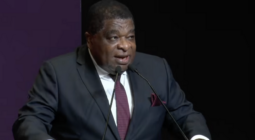

Global MP poll reveals enduring optimism amid growing concerns about democracy
On the eve of International Day of Parliamentarism and the Organization’s 136th anniversary on 30 June, the Inter-Parliamentary Union (IPU) has released the results of its annual parliamentarians’ perceptions poll.
The results provide a comprehensive snapshot of the views, motivations and concerns of the global parliamentary community.
The poll, conducted online from 5 to 13 June 2025, drew close to 800 responses from current and former MPs, parliamentary staff and experts, and incorporated new in-depth analysis by region, gender, status and key socioeconomic indicators.
Key global challenges: Climate change, war and democracy
Consistent with last year’s findings, respondents identified climate change, war and armed conflict, and the weakening of democracies as the top three most urgent global challenges.
Income inequality also emerged as a top concern at the national level. Notably, the number of those polled citing a perceived threat to democracy increased significantly compared with 2024 (+7 percentage points).
Artificial intelligence, digital hate and misinformation also rose in the rankings of global challenges compared with 2024 (+2 and +4 percentage points respectively)
Optimism persists
Despite these challenges, optimism remains robust: 58% of respondents are very optimistic or somewhat optimistic about their country’s future (virtually unchanged from 2024), while over 50% are optimistic about the world’s future — a five-point increase from last year. Current MPs are more optimistic than former MPs.
The survey revealed a paradoxical inverse relationship between optimism and national development indicators. Respondents from countries with lower Human Development Index rankings, lower per capita gross domestic product (GDP), and higher Gini coefficients (indicating more inequality) reported higher levels of optimism. This trend was especially pronounced in Sub-Saharan Africa and Asia, and among male respondents.
Decline in feelings of safety
While most parliamentarians and staff reported feeling very safe or somewhat safe in their work environments (62% in total), this is significantly lower than last year (75%). Respondents from the Americas and Sub-Saharan Africa felt the least safe in parliament.
Those who have served in parliament are highly likely to seek re-election, with workplace environment and public perceptions of politicians cited as the most influential factors in that decision.
Interestingly, even among those who reported feeling very unsafe, a significant proportion still intend to run again — highlighting a strong sense of duty and resilience among elected officials.
Gender and regional differences
While responses were largely consistent across regions, genders and status, several notable exceptions emerged:
Gender-based discrimination and violence: Women parliamentarians identified gender-based discrimination and violence as a significant concern, a view not shared by their male counterparts.
Migration: Respondents in North America and Europe ranked migration as a more pressing issue than those in Asia and the Middle East/Africa.
Trade wars: Parliamentarians from the United States’ principal allies (Australia, Canada, Ireland, United Kingdom) consider trade wars a greater concern than respondents from other countries.
United States: US-based respondents uniquely ranked the weakening of democracies as their top issue, underscoring heightened concerns about democratic institutions in their country.
Career satisfaction
Respondents remain divided on whether they would recommend a political career to their children, with roughly equal percentages for and against across all categories. Current and former MPs, as well as those who feel optimistic and safe, are more likely to recommend politics as a career. This, combined with the high proportion willing to run for office again, suggests a generally high level of job satisfaction among elected officials.
For the first time, the poll asked about motivations for service. The primary drivers were the desire to shape legislation and policy, and to help one’s community or constituency — reinforcing the conclusion that an enduring commitment to public service is prevalent among MPs.
About the data: New socioeconomic cross-tabulations
The results of the 2025 IPU perceptions poll are based on nearly 800 responses, 51% male and 49% female.
Current and former MPs make up 31% of responses, current and former staff make up 43%, and others 28%.
The breakdown per region is as follows:
| Americas | 13% |
| Asia | 14% |
| Europe | 33% |
| Middle East and North Africa | 8% |
| Pacific | 3% |
| Sub-Saharan Africa | 29% |
This year’s poll also integrated three key datasets for deeper analysis: the United Nations Development Programme’s Human Development Index, the Gini Coefficient (income inequality), and per capita GDP.
The poll cannot be considered exhaustive as responses are skewed towards certain regions and demographics. But it does provide an insight into the trends of what the global parliamentary community is thinking and feeling on the eve of this year’s International Day of Parliamentarism.






